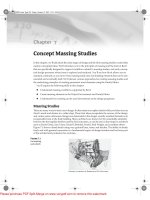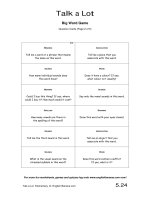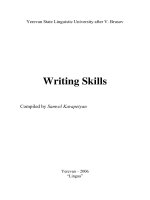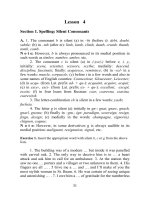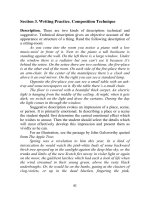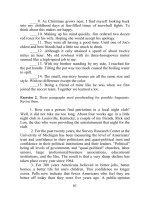Tài liệu Developing writting skills 1 part 8 pptx
Bạn đang xem bản rút gọn của tài liệu. Xem và tải ngay bản đầy đủ của tài liệu tại đây (202.66 KB, 10 trang )
Exercise 1. Arrange these sentences in a logical order.
1. George always shaves and dresses before eating. Sometimes
he falls asleep again. Then he brushes his teeth, puts on his coat, and
says goodbye before he leaves for the office. When the alarm clock
rings, George wakes up and turns it off. If this happens, his mother
wakes him up so that he won’t be late for work. After he finishes
breakfast, he usually reads the morning newspaper.
2. Begin by breaking the eggs into a bowl, adding small
amounts of salt, pepper, and milk. When the butter in the frying pan
has melted, pour in the egg batter. To make a small omelet you need
three eggs, a slice of cheese, salt, pepper, butter, milk, a frying pan, a
bowl and a spatula. Then heat the frying pan over a medium gas,
melting a small amount of butter in it. After the eggs are partially
cooked, place a slice of cheese on them and fold one half of the
omelet over the other half. Remove from the frying pan and serve.
Exercise 2. Join the following short sentences together to make a single
paragraph using the following conjunctions: and, but, so, as, while, if, when,
because, etc.
1. I saw some lovely dresses in a shop-window. 2. I was
walking along Regent Street. 3. I couldn’t buy one. 4. I didn’t have
enough money with me. 5. There was a sale in the shop. 6. I knew if
I waited until tomorrow they would all be sold. 7. I got on a bus. 8. I
went straight home. 9. I grabbed my purse. 10. I came out again. 11.
I went back to the shop. 12. It was full of women all talking
excitedly. 13. I looked at several dresses. 14. I chose one that was
marked five pounds. 15. I opened my purse to pay for it. 16. I found,
to my dismay, there was only three pounds in it. 17. Fortunately, the
shop assistant was sympathetic. 18. She promised to keep the dress
for me. 19. I left three guineas as a deposit.
Exercise 3. Study the following passage and work at the assignments given
below:
1. Find the key sentence in the first paragraph.
2. Copy out the sentences that develop the key sentence.
71
3. Prove that the first paragraph is well-constructed, that it possesses unity,
logical sequence of thought and length.
4. Give the paragraph a title.
5. Paraphrase the paragraph.
Thus I learned from life itself. At the beginning I was only a
little mass of possibilities. It was my teacher who unfolded and
developed them. When she came, everything about me breathed of
love and joy and was full of meaning. She has never since let pass an
opportunity to point out the beauty that is in everything, nor has she
ceased trying in thought and action and example to make my life
sweet and useful.
It was my teacher’s genius, her quick sympathy, her loving tact
which made the first years of my education so beautiful. It was
because she seized the right moment to impart knowledge that made
it so pleasant and acceptable to me.
My teacher is so near to me that I scarcely think of myself
apart from her. How much of my delight in all beautiful things is
innate, and how much is due to her influence, I can never tell. I feel
that her being is inseparable from my own, and that the footsteps of
my life are in hers. All the best of me belongs to her – there is not a
talent, or an aspiration or a joy in me that has not been awakened by
her loving touch.
(After Helen Keller)
Section 3. Writing Practice. Composition Writing.
A composition is a creative literary work, conveying several
problems or dealing with one problem in detail. It is too often the
area where students lack confidence because they are on their own
and have no guidelines on which to base their work. Creative writing
demands a good knowledge and awareness, a special ability to
present facts and ideas clearly, concisely and attractively. It is true
that you cannot teach students to write any more than you can teach
them to paint, but you can definitely guide them to develop a
technique. Before writing on any subject it is necessary to have a
stock of ideas relative to it.
72
Beginning of Compositions. A good beginning is of great
importance, for we naturally desire to hold the readers’ attention
from the first. The opening paragraph should appear to be natural and
it can always be direct. It is a good plan to get right into the subjest
to be discussed, arrest the attention of the reader with the first
sentence. There are many ways of beginning a composition, among
them: a) general reflection; b) by giving a definition and thus
immediately introducing the subject; c) a quotation or a proverb; d)
an anecdote; if appropriate, this is a neat way of beginning. Whatever
the form opening, it should make the reader hungry for more.
Ending of Compositions. The ending should obviously prove to the
reader that the subject has been nicely rounded off; that the whole is
finished and complete.
The Body of a Composition. After you have considered the making
of a skeleton or framework on which to base a composition turn to
the skeleton whose bones must be clothed. Before beginning to write,
it is best to think of various points in the skeleton, make up your
mind what you want to say under the heading and gradually expand
each into a paragraph. Examine your skeleton to make sure that there
is a development from the opening paragraph to the end.
When writing a composition remember the stages of your
work:
1. Collect your material.
2. Select the information you need.
3. Arrange the material in the order of presentation according
to your plan.
4. Write down the main topics of each paragraph.
5. Under each topic indicate the development.
6. Make a rough draft.
7. Correct the rough draft and make your final copy.
Exercise.
The aim of this exercise is to help students to write compositions
by going over corresponding language notes. These notes will give them
constructive guidance on composition writing, providing them with possible
alternatives, useful phrases, language accuracy and structural harmony.
73
A Dream.
Useful phrases and sentences:
1. A Pleasant Dream
A. I had a dream ... [NOT: I saw a dream ...]
I saw someone (something) in my dream
I dreamt of someone (something).
B. I dreamt I was ... – flying // London [Paris, France, etc.]
- houses below // Like dolls’ houses
- arrived // London airport in a couple of hours
- took me // hour or so // get to my hotel
- hotel // Oxford Street
- was // first trip to London
Everything looked so different
I was just about to – speak to the Queen // visit Westminster
Abbey // enter Buckingham Palace – when ...
I
was in – Hyde Park // Trafalgar Square // St. Paul's
Cathedral – when ... alarm clock woke me up // mother woke
me up // time to go to college // telephone rang
C. I hope my dream will come true
- pity // wasn't true
- pity // only a dream
- hope // visit London one day
2. A Bad Dream (A Nightmare)
A. Last night I had a bad (horrible, terrible) dream [a
nightmare]
I saw I was ... – I had eaten a heavy meal
I had received some bad news
I had been reading a frightening book
I had been watching a horror film
I had a high temperature
B. I dreamt I was alone in a strange house:
- no lights in it
- heard // strange moan
- someone grabbed // arm
- held to the floor
- lights went on
- knife was held to my throat
- wanted my money
74
- was scared // gave all my money
- tied to a chair
- robbers disappeared into the night
- screamed at the top of my voice
- neighbour came // telephoned the police
- free again
C. - hope // happy
- never have such a nightmare again
... mother woke me up
... telephone rang
- alarm clock woke me up
I woke up suddenly
Points to think about:
• Do you often dream? [Do you like dreaming? Why? – Why
not?]
• What sort of dream did you have last night? [nice – bad –
exciting – a nighmare]
• Have you ever had a dream that was so bad you could not
forget it?
• Can you think why you had that dream? Do you know if it
meant anything?
• How would you feel if that dream came true?
• What can you do to avoid having dreams?
a) not eat too much before sleeping
b) not have worries (problems)
c) not overwork (over-tired)
• Have you had a dream that came true later? What was it
about?
Some helpful words and expressions: the next day – on the
contrary – after all – moreover – during – even if – another thing is –
finally.
75
